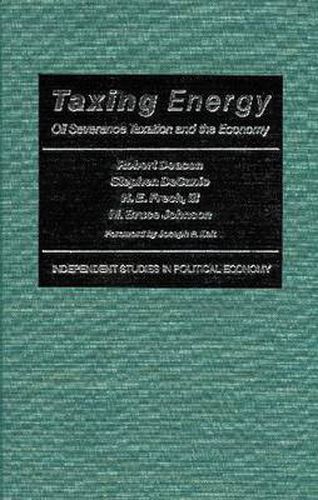Readings Newsletter
Become a Readings Member to make your shopping experience even easier.
Sign in or sign up for free!
You’re not far away from qualifying for FREE standard shipping within Australia
You’ve qualified for FREE standard shipping within Australia
The cart is loading…






Severance taxes on the extraction of oil, gas, and other natural resources have been very popular with politicians because they appear to be ‘invisible’ in being spread among a large, diffuse taxpayer base. But do such taxes have serious negative consequences overlooked by legislators? Severance taxes-taxes levied upon the production of oil and natural gas-have long been popular with state governments. Such taxes are thought to have minimal impact upon the areas where petroleum wells are located, the costs of such taxes can be ‘exported’ to a large and dispersed consumer base in other states, and an oil or gas well can not be moved to another state where taxes are lower. Because of these factors, severance taxes seem like ‘ideal’ taxes for legislators to impose. But how do severance taxes work in the real world? Are they really as ‘painless’ as they sound? Because of the immobility of the resource being taxed, do states tend to overtax? In this provocative study, the authors survey state severance taxes and find they tend to lower petroleum production, reduce jobs in the states imposing such taxes, and have negative effects that can ripple throughout a state’s economy. Severance taxes look like ‘easy targets’ for state governments. But as this book demonstrates-using thorough analysis-such taxes are often downright counterproductive and can actually reduce total state tax revenues.
$9.00 standard shipping within Australia
FREE standard shipping within Australia for orders over $100.00
Express & International shipping calculated at checkout
Stock availability can be subject to change without notice. We recommend calling the shop or contacting our online team to check availability of low stock items. Please see our Shopping Online page for more details.
Severance taxes on the extraction of oil, gas, and other natural resources have been very popular with politicians because they appear to be ‘invisible’ in being spread among a large, diffuse taxpayer base. But do such taxes have serious negative consequences overlooked by legislators? Severance taxes-taxes levied upon the production of oil and natural gas-have long been popular with state governments. Such taxes are thought to have minimal impact upon the areas where petroleum wells are located, the costs of such taxes can be ‘exported’ to a large and dispersed consumer base in other states, and an oil or gas well can not be moved to another state where taxes are lower. Because of these factors, severance taxes seem like ‘ideal’ taxes for legislators to impose. But how do severance taxes work in the real world? Are they really as ‘painless’ as they sound? Because of the immobility of the resource being taxed, do states tend to overtax? In this provocative study, the authors survey state severance taxes and find they tend to lower petroleum production, reduce jobs in the states imposing such taxes, and have negative effects that can ripple throughout a state’s economy. Severance taxes look like ‘easy targets’ for state governments. But as this book demonstrates-using thorough analysis-such taxes are often downright counterproductive and can actually reduce total state tax revenues.